June 18, 2025 | 08:59 GMT +7
June 18, 2025 | 08:59 GMT +7
Hotline: 0913.378.918
June 18, 2025 | 08:59 GMT +7
Hotline: 0913.378.918
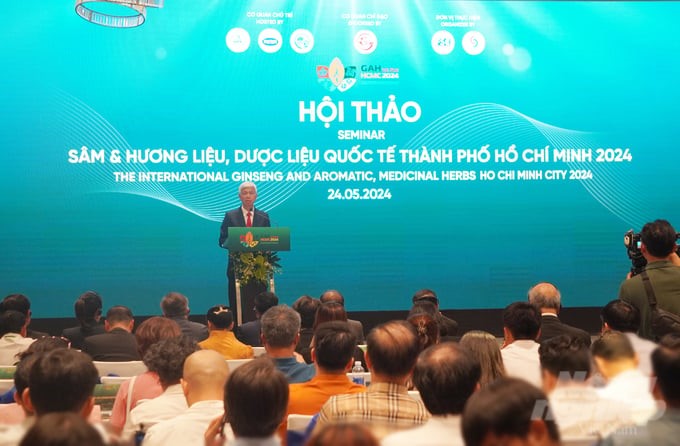
Vice Chairman of the Ho Chi Minh City People's Committee Vo Van Hoan spoke at the seminar. Photo: Nguyen Thuy.
On May 24, the Ho Chi Minh City Department of Foreign Affairs coordinated with the Ho Chi Minh City Department of Agriculture and Rural Development to organize the seminar "The International Ginseng and Aromatic, Medicinal Herbs Ho Chi Minh City 2024." The seminar is within the framework of the "International Ginseng and Aromatic, Medicinal Herbs Festival 2024 in Ho Chi Minh City," attracting many domestic and international businesses.
Speaking at the opening of the seminar, Mr. Nguyen Xuan Hoang, Deputy Director of the Ho Chi Minh City Department of Agriculture and Rural Development, said that with favorable natural conditions, Vietnam has diverse and rich forest resources and many typical natural forest ecosystems. In particular, the mangrove forest ecosystem is a place to store and preserve very rich, rare, and endemic genetic resources of biodiversity. This has great potential to preserve and develop many rare medicinal herbs, providing raw materials for domestic production and processing.
Vietnam currently has 5,117 species of medicinal plants, more than 50 species of seaweed, 75 species of minerals, and approximately 410 species of medicinal animals. Among these, many precious medicinal herbs were recognized by the world, such as star anise, cinnamon, artichoke, Ngoc Linh Ginseng, etc. With the diversity of climate and soil, since the late 1980s, specialized medicinal herb growing and production areas have been formed in Vietnam.
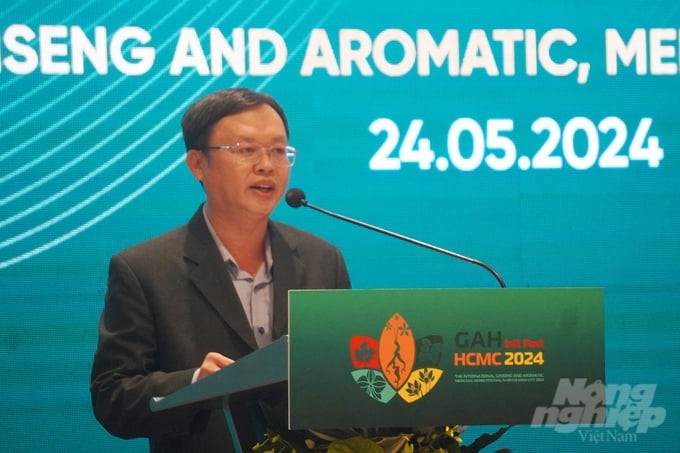
Mr. Nguyen Xuan Hoang, Deputy Director of the Ho Chi Minh City Department of Agriculture and Rural Development, spoke at the seminar. Photo: Nguyen Thuy.
Developing medicinal herbs has been given early attention by the Party and the State. There have been about 50 documents issued by the Party, Government, and relevant ministries and branches directly or indirectly related to medicinal herb development in Vietnam, according to Decision 376/QD-TTg in 2021 approving 'Program for developing the pharmaceutical industry and domestically produced medicinal materials by 2030, with a vision to 2045.'
This program aims to build the domestic pharmaceutical industry to achieve a high level of development, reaching level 4 according to the classification scale of the World Health Organization (WHO) and having a market value in the Top 3 in ASEAN. Thereby, contributing to ensuring an adequate and timely supply of quality, safe, effective, and reasonably priced medicine.
Besides, develop medicinal herbs and products from domestic medicinal herb sources into the field of producing goods of high quality and value that are competitive in the domestic and world markets. In particular, Ngoc Linh ginseng has been recognized as a national treasure of Vietnam, and there are many policies and mechanisms to help develop this rare herb of high economic value.
"With more than 5,000 medicinal plant species, Vietnam has many potentials and advantages to develop medicinal herbs into an economic-technical industry of medicinal herbs and aromatics, used for many different purposes for humans, such as producing therapeutic medicine, food, macrobiotics, beverages, cosmetics, etc. In addition, medicinal plants are also used as raw materials for the production of pesticides, veterinary medicine, and aquatic medicine," said Mr. Nguyen Xuan Hoang, Deputy Director of the Ho Chi Minh City Department of Agriculture and Rural Development.
According to Mr. Hoang, the total market value of global herbal products in 2021 is estimated at about USD 230 billion and is expected to reach USD 430 billion by 2028.
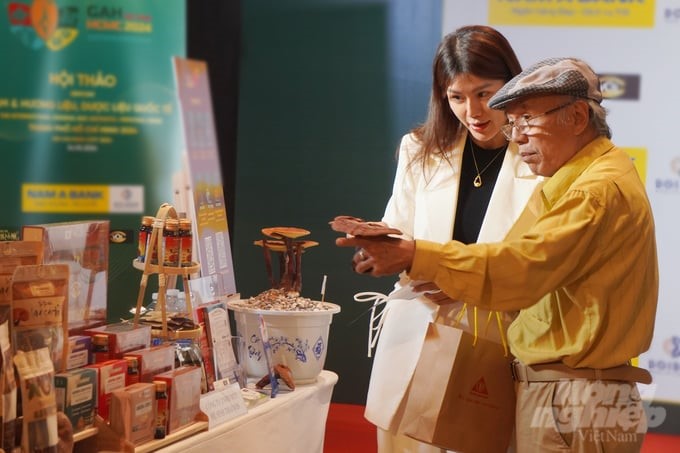
At the seminar, many businesses introduced Vietnam’s ginseng, medicinal herb, and aromatic products. Photo: Nguyen Thuy.
Mr. Vo Van Hoan, Vice Chairman of the Ho Chi Minh City People's Committee, said that the total output of medicinal herbs grown in Vietnam is now estimated at about 100,000 tons/year. Among these are many precious, rare, and endemic medicinal plants that have both high economic value and therapeutic uses, such as Ngoc Linh ginseng, Lai Chau ginseng, Anoectochilus, Panax stipuleanatus, Taxus wallichiana, Berberis julianae, etc.
However, current investment resources for the development of medicinal herbs are still limited; the products are largely self-sufficient and lack linkages, especially information about the international market. Therefore, the Government has issued many policies and mechanisms to encourage investment in developing the ginseng, aromatic, medicinal herb industry.
Of which, eight key medicinal regions of Vietnam, according to the Government's planning, include the Northwest, Northeast, Red River Delta, North Central, South Central Coast, Central Highlands, Southeast, and Southwest.
Especially about ginseng, according to MARD, the development of ginseng and ginseng products is not commensurate with Vietnam's potential and strengths due to the lack of legal quality seed sources; connections and mutual support between sectors and resources that have not been created; and the shortage of pre-processing, deep processing facilities, and advertising and promotion of consumption markets.
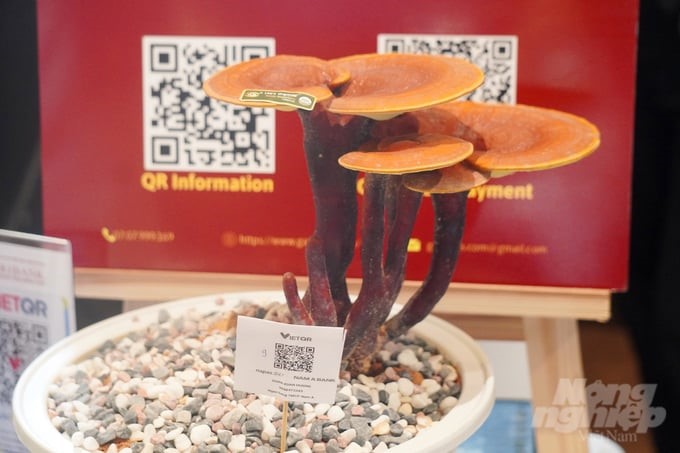
A medicinal mushroom product was introduced at the seminar. Photo: Nguyen Thuy.
Faced with that situation, on June 1, 2023, the Prime Minister issued Decision 611/QD-TTg approving the program "Developing Vietnamese Ginseng Until 2030, with a Vision to 2045." Accordingly, the policy is to develop ginseng into a national brand and, at the same time, build an international brand for Vietnamese ginseng.
According to the Government's direction, localities with potential and strengths in ginseng, such as Kon Tum, Quang Nam, Gia Lai, etc., are focusing on investing to develop ginseng as well as concentrated ginseng raw material areas, striving to achieve about 21,000 hectares of growing ginseng by 2030.
Of which, the objects of conservation, development, processing, and trade on a commodity scale are Ngoc Linh ginseng and Lai Chau ginseng. The organization of trade promotion and product promotion activities will also be enhanced in the coming time.
According to Mr. Vo Van Hoan, Vice Chairman of the Ho Chi Minh City People's Committee, this seminar will contribute to realizing the policy of sustainable development and international cooperation of the ginseng, aromatic, medicinal herb industry in Vietnam.
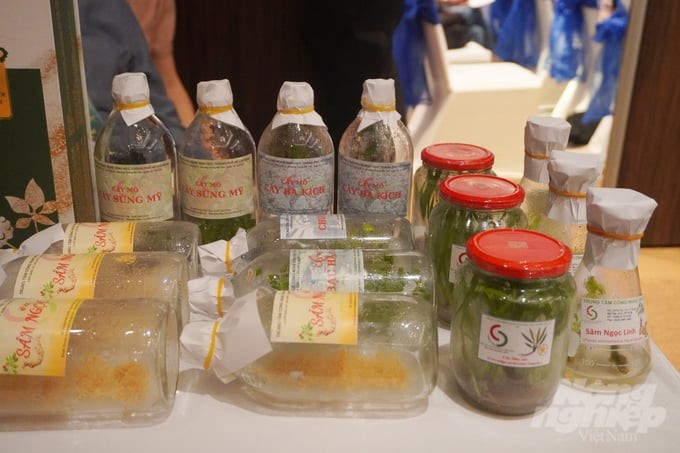
Medicinal herbs are researched and developed by the Biotechnology Center of Ho Chi Minh City (Ho Chi Minh City Department of Agriculture and Rural Development). Photo: Nguyen Thuy.
The seminar was attended by leading experts, researchers, and scientists in the fields of ginseng, aromatic, and medicinal herbs, both domestically and internationally. The seminar focused on discussing the application of science and technology to the process of growing, producing, processing, and preserving ginseng, aromatic, and medicinal herbs in Vietnam; orienting sustainable development and international cooperation in the ginseng, aromatic, medicinal herb industry in Vietnam.
Translated by Huyen Vu Thu
/2025/06/17/3942-2-143243_548.jpg)
(VAN) Recently, in Sweden, the Secretary of the Binh Dinh Provincial Party Committee presented the Investment Registration Certificate for the 'Polyester Fabric Recycling Complex' project to SYRE Impact-AB Company.
/2025/06/12/3721-2-202745_83.jpg)
(VAN) TH made an impression at Seoul Food 2025 with its line of natural beverages, paving the way for Vietnamese food products to enter the South Korean market.

(VAN) Soc Trang's success in rice exports stems from a strategy of developing fragrant and specialty rice cultivation areas and standardizing production toward low-emission practices.
/2025/06/11/1311-5-120811_839.jpg)
(VAN) The pig farming industry is facing the challenge of comprehensive restructuring to meet requirements for quality, safety, traceability, and market expansion both domestically and for export.

(VAN) Vietnam considers participating in ALGROALBA in order to expand agricultural production, coordinate the assessment and effective exploitation potential land.
/2025/06/05/5314-1-184727_407.jpg)
(VAN) From seemingly worthless fish scales and skin, enzymes and lactic ferments can transform by-products into peptides, opening a sustainable, effective business direction and elevating Vietnamese seafood.

(VAN) TTC AgriS and IFC signed a strategic partnership to develop a sustainable agricultural value chain, aiming to achieve the Net Zero target by 2035.